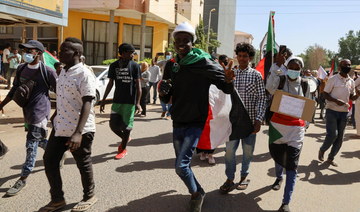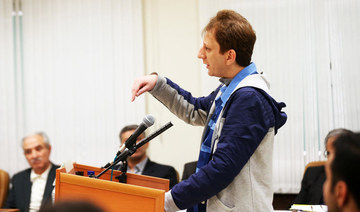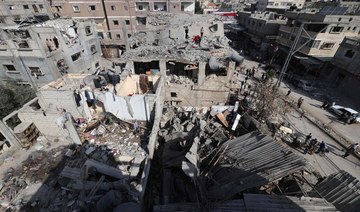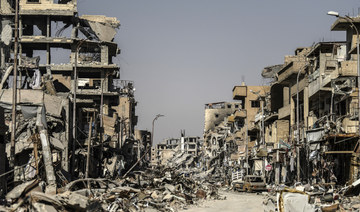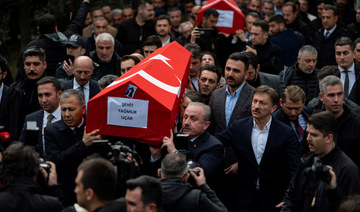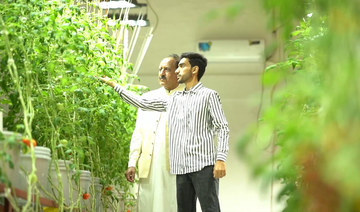CAIRO: Amira Osman, a Sudanese women’s rights activist, was getting ready for bed a few minutes before midnight when about 30 policemen forced their way into her home in Khartoum last month.
The men, many in plainclothes and armed with Kalashnikov rifles, pistols and batons, banged on her bathroom door, ignoring her mother’s pleas to at least allow her to get dressed before they took her away.
“It was like they were engaging in a battle or chasing a dangerous terrorist, not a disabled woman,” said Osman’s sister, Amani, a rights lawyer.
Osman, who uses crutches since a 2017 accident, was imprisoned twice under Sudan’s former autocratic President Omar Al-Bashir for violating strict Islamic laws governing women’s behavior and dress. This time, she was detained for speaking out against military rule.
With her Jan. 22 arrest, Osman joined hundreds of activists and protest leaders targeted since a military coup last October removed a transitional government from power.
The detentions have intensified in recent weeks as Sudan plunged into further turmoil with near-daily street protests, sparking fears of an all-out return to the oppressive tactics of Al-Bashir. The coup upended Sudan’s transition to democratic rule after three decades of international isolation under Al-Bashir, who was removed from power in 2019 after a popular uprising.
“The military delivers one message to international diplomats, that they are interested in a political dialogue and fundamental reform of the state, but then they do nothing to hide their blatant efforts to maintain the status quo and undermine efforts to unseat them,” said Cameron Hudson, a former US State Department official and Sudan expert at the Atlantic Council’s Africa Center.
Following the coup, security forces launched a deadly crackdown on protesters. They fired live ammunition and tear gas at crowds on the streets and knocked the country’s Internet and mobile signal offline — all in efforts to keep people from gathering. Around 80 people, mostly young men, have been killed and over 2,200 others injured in the protests, according to a Sudanese medical group.
Sudanese security forces have also been accused of using sexual violence against women taking part in the demonstrations. The ruling, military-led Sovereign Council said a probe was launched into the allegations of rape and gang rape on Dec. 19, after the United Nations called for an investigation. It is not the first time security forces have been accused of using rape — such attacks occurred under Al-Bashir and also under the military during the transitional period.
The US, UK, and Norway, along with the European Union, Canada and Switzerland, called the recent pattern “troubling,” and urged the release of “all those unjustly detained.”
“We remind Sudan’s military authorities of their obligations to respect the human rights and guarantee the safety of those detained or arrested and the need to ensure that due process is consistently followed in all cases,” the group said in a statement released by the US State Department.
Osman’s detention drew condemnation and concern internationally. She was finally released on Sunday.
But for nearly a week after the arrest, her family didn’t know where she was held. Then, they received a phone call asking them to send clothes to a prison in Khartoum’s twin city, Omdurman, according to her sister, who also is her lawyer.
Osman said she spent the first three days in solitary confinement in “very bad and humiliating conditions.” Then another activist, Eman Mirghani, joined her in the cell. Mirghani remains in detention.
Authorities accused Osman of possession of illegal weapons and ammunition — the “five old bullets” found in her wardrobe, she said, souvenirs from the 2016 national shooting championship in which she competed.
It’s unclear who the officers are who stormed Osman’s house. During the raid, they said they were from a drug-combating force, but Amani Osman, the sister-lawyer, said she believes they were actually from the country’s feared General Intelligence Service.
Formerly known as the National Intelligence and Security Service, the agency was for decades a tool used by Al-Bashir’s government to clamp down on dissent. After the coup, the military reinstated the agency’s powers, which include detaining people without informing their families. They are known to keep many of their detainees in secret prisons called “Ghost Houses.”
Gibreel Hassabu, a lawyer with the Darfur Bar Association, a legal group that focuses on human rights, said the exact number of those detained across the county is still unknown — a situation reminiscent of Al-Bashir’s rule.
Hassabu says he knows of over 200 activists and protest leaders detained in the Sudanese capital alone. Many activists were taken from their homes or snatched from the streets, according to documents he provided to The Associated Press.
At least 46 activists are held in Khartoum’s Souba Prison, the documents show. Some female activists — including Amira Osman — are sent to the women’s prison in Omdurman.
The wave of arrests has expanded following the killing of a senior police officer during a Jan. 13 protest close to the presidential palace in Khartoum. The officer was stabbed to death, according to local media. Security forces raided a Khartoum hospital and arrested six, including an injured protester and women who were visiting him, accusing them of being responsible for the killing.
And on Jan. 29, paramilitary troops from the Rapid Support Forces, another security body with a reputation for brutality, grabbed Mohamed Abdel-Rahman Naqdalla, an activist and physician, from a Khartoum street, his family said.
A spokesman for the RSF did not answer requests for comment. The force is largely comprised of former militiamen and has been implicated in atrocities under Al-Bashir in the the western region of Darfur. It is headed by the country’s second most powerful general, Mohammed Hamdan Dagalo, and runs its own detention centers in Khartoum and elsewhere in the country.
This week, authorities rearrested Khalid Omar, a minister in the ousted transitional government. Omar had been detained in the Oct. 25 coup and was released a month later as part of a deal between the military and civilian leaders. His party, the opposition Sudanese Congress Party, said he was taken Wednesday at the party’s headquarters.
Also arrested Wednesday was Wagdi Saleh, a member of a government-run agency tasked with dismantling the legacy of Al-Bashir’s regime, according to the pro-democracy Forces of Freedom and Change alliance.
The trend has frustrated diplomats working to bring the military and civilian leaders to some sort of an agreement.
“Arbitrary arrests and detention of political figures, civil society activists and journalists undermine efforts to resolve Sudan’s political crisis,” said Lucy Tamlyn, US chargé d’affaires in Sudan.
Sudan’s military rulers step up crackdown, arrest activists
https://arab.news/bs8yg
Sudan’s military rulers step up crackdown, arrest activists
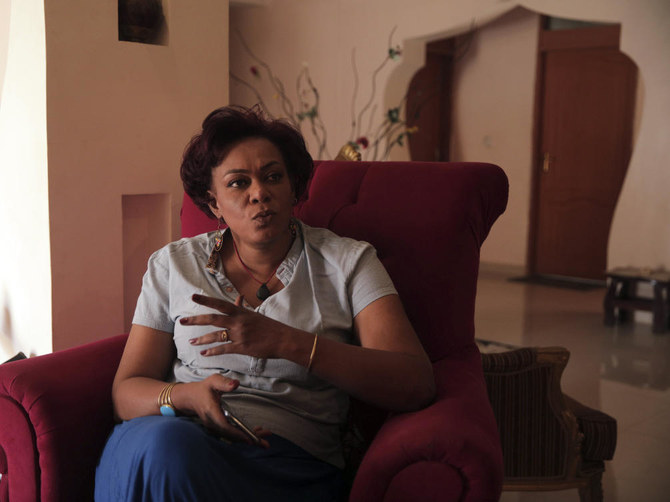
- The detentions have intensified in recent weeks as Sudan plunged into further turmoil with near-daily street protests
- It’s unclear who the officers are who stormed Osman’s house
Iran slaps sanctions on US, UK over Israel support
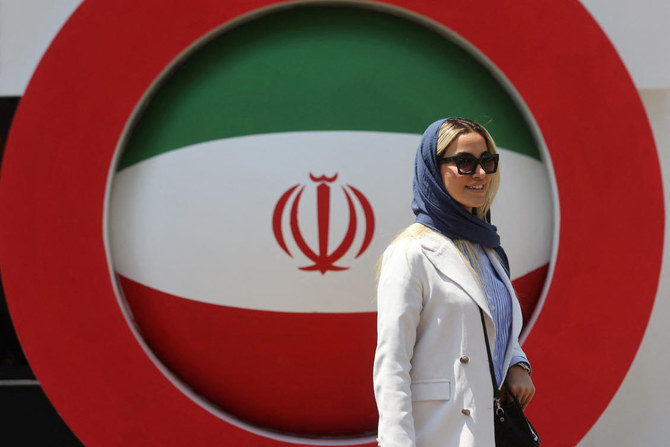
- Sanctions targeted seven Americans
- British officials and entities targeted include Secretary of State for Defense Grant Shapps
TEHRAN: Iran announced on Thursday sanctions on several American and British individuals and entities for supporting Israel in its war against the Palestinian militant group Hamas.
The Islamic republic, the regional arch-foe of Israel, unveiled the punitive measures in a statement from its foreign ministry.
It said the sanctions targeted seven Americans, including General Bryan P. Fenton, commander of the US special operations command, and Vice Admiral Brad Cooper, a former commander of the US Navy’s Fifth Fleet.
British officials and entities targeted include Secretary of State for Defense Grant Shapps, commander of the British army strategic command James Hockenhull and the UK Royal Navy in the Red Sea.
Penalties were also announced against US firms Lockheed Martin and Chevron and British counterparts Elbit Systems, Parker Meggitt and Rafael UK.
The ministry said the sanctions include “blocking of accounts and transactions in the Iranian financial and banking systems, blocking of assets within the jurisdiction of the Islamic Republic of Iran as well as prohibition of visa issuance and entry to the Iranian territory.”
The impact of these measures on the individuals or entities, as well as their assets or dealings with Iran, remains unclear.
The war in the Gaza Strip erupted after the October 7 attack by Palestinian militants on Israel which killed 1,170 people, mostly civilians, according an AFP tally based on official Israeli figures.
Iran backs Hamas but has denied any direct involvement in the attack.
Israel’s retaliatory offensive against Hamas has since killed at least 34,568 people in Gaza, mostly women and children, according to the Hamas-run territory’s health ministry.
12-truck UAE aid convoy enters Gaza Strip
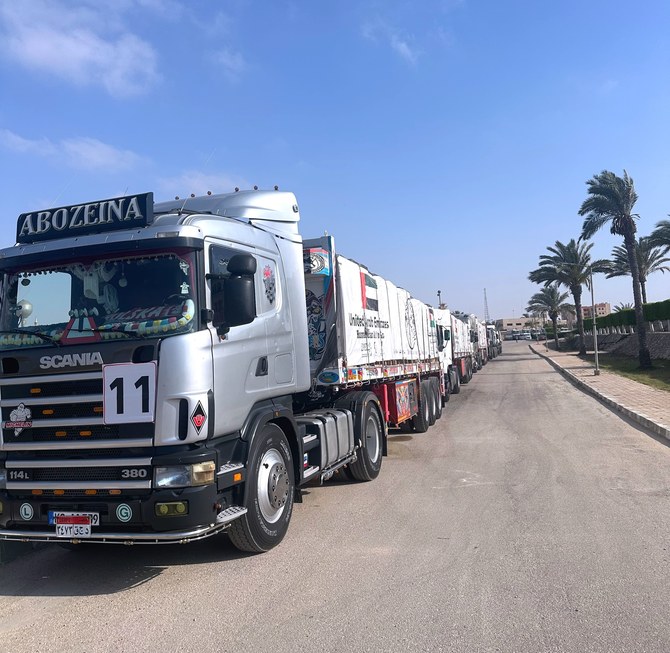
- UAE has also sent Palestinians food, water via sea, air
- Emirates has provided medical treatment for thousands
Al-ARISH: A UAE aid convoy entered the Gaza Strip on Wednesday via Egypt’s Rafah Crossing Point as a part of the country’s “Operation Chivalrous Knight 3” project to support the Palestinian people, UAE state news agency WAM reported on Thursday.
The 12-truck convoy is transporting over 264 tonnes of humanitarian aid including food, water and dates.
The latest convoy now brings to 440 the number of trucks that have been used for support efforts.
As of May 1, 2024, the UAE has now provided the Palestinians 22,436 tonnes of aid, which has included the deployment of 220 cargo planes and three cargo ships. The goods pass through Al-Arish Port and the Rafah crossing into Gaza.
These efforts are a part of the “Birds of Goodness” operation, which involves aerial drops of humanitarian supplies. By Wednesday, 43 drops have been conducted, delivering a total of 3,000 tonnes of food and relief materials to inaccessible and isolated areas in Gaza.
Since its establishment, medical staffers at the UAE’s field hospital in Gaza have treated more than 18,970 patients. An additional 152 patients were evacuated to the UAE’s Floating Hospital in Al-Arish Port, and 166 to the UAE for treatment.
The UAE has set up six desalination plants with a production capacity of 1.2 million gallons per day to support the people in Gaza.
Syrians accuse Russia of hitting hospital in new complaint filed with UN rights committee

- Moscow has repeatedly denied accusations that it violated international law in Syria
BEIRUT: A Syrian man and an aid organization have accused Russia of violating international law by deliberately bombing a hospital in northern Syria in 2019, in a new complaint filed at the United Nations Human Rights Committee this week.
Russia, which intervened militarily in Syria’s conflict in 2015 to bolster the forces of its ally President Bashar Assad, has been accused by UN investigators of committing war crimes in Syria, but has not faced any international tribunal.
Moscow has repeatedly denied accusations that it violated international law in Syria.
The new complaint, filed on May 1 but made public on Thursday, accuses Russia’s Air Force of killing two civilians in a series of air strikes on the Kafr Nobol Surgical Hospital in the northwest province of Idlib on May 5, 2019.
It was brought to the committee by the cousin of those killed and by Hand in Hand for Aid and Development, an aid group that was supporting the hospital, which was in territory held by armed groups opposed to Assad.
The complaint relies on videos, eyewitness statements and audio recordings, including correspondence between a Russian pilot and ground control about dropping munitions.
“Syrians are looking to the Human Rights Committee to show us some measure of redress by acknowledging the truth of this brutal attack, and the suffering caused,” said Fadi Al-Dairi, the director of Hand in Hand.
The Geneva-based Human Rights Committee is a body of independent experts that monitors the status of political and civil rights around the world, and can receive complaints by states and individuals on alleged violations.
Individual complaints can lead to compensation payments, investigations or other measures.
While rights groups have accused both Syria and Russia of violating international law within Syria for years, neither country is party to the International Criminal Court’s Rome Statute, and opportunities for accountability are rare.
Russia signed onto the Optional Protocol to the International Covenant on Civil and Political Rights in 1991, meaning it accepts the Human Rights Committee’s ability to consider complaints from individuals against it.
“This complaint before a preeminent international human rights tribunal exposes the Russian government and armed forces’ deliberate strategy of targeting health care in clear violation of the laws of war,” said James A. Goldston, executive director of the Justice Initiative, whose lawyers are representing the applicants.
In 2019, the UN Human Rights Commission — a separate body — said strikes on medical facilities in Syria including the Kafr Nobol hospital “strongly” suggested that “government-affiliated forces conducting these strikes are, at least partly, if not wholly, deliberately striking health facilities.”
Morocco’s farming revolution: defying drought with science
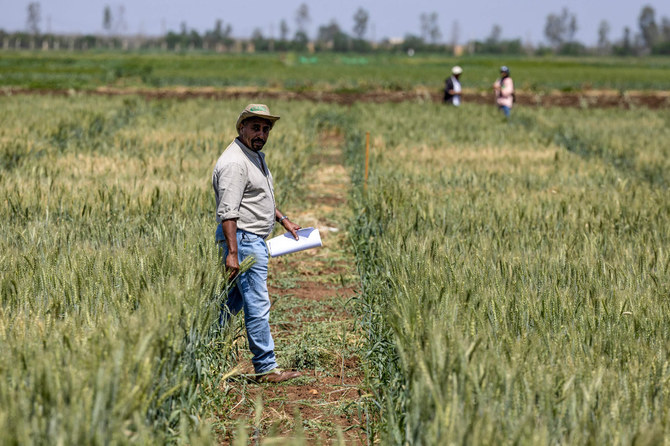
- In the face of “extremely high” water stress, Morocco's cultivated areas are expected to shrink to 2.5 million hectares drastically
- The kingdom's agricultural research agency aims to develop genotypes that not only withstand drought and heat but also yield abundantly
MARCHOUCH, Morocco: In the heart of sun-soaked Morocco, scientists are cultivating a future where tough crops defy a relentless drought, now in its sixth year.
“Look at these beautiful ears of wheat,” said Wuletaw Tadesse Degu, the head of wheat breeding at the International Center for Agricultural Research in Dry Areas (ICARDA).
“The difference in quality between our field and others is striking,” he said, pointing toward a lush expanse in Marchouch, south of Rabat, that stood in stark contrast with the barren lands elsewhere.
By 2040, Morocco is poised to face “extremely high” water stress, a dire prediction from the World Resources Institute, a non-profit research organization.
Figures from the North African country’s central bank paint a grim picture.
Cultivated areas across the kingdom are expected to shrink to 2.5 million hectares in 2024 compared with 3.7 million last year, with cereal yields more than halving to 25 million quintals (2.5 million tons) over the same period.
“It has become essential to use resilient seeds and to employ them as quickly as possible,” said Tadesse, whose center recently inaugurated a plant gene bank.

Tadesse’s mission is to develop genotypes that not only withstand drought and heat but also yield abundantly.
Last year, while the nation struggled, Marchouch achieved a yield of four tons per hectare with just 200 millimeters of rainfall.
Controlled irrigation and strategic sowing techniques are behind this agricultural revolution.
Looking to maximize production, farmers are experimenting with planting times and judicious irrigation.
Even a scant 10 millimeters of water, carefully applied, transformed barren soil into thriving fields.
Barley, too, has seen a resurgence, with yields jumping from 1.5 to two tons per hectare last year, thanks to climate-smart genotypes, said Miguel Sanchez Garcia, a barley specialist at ICARDA.
The center, which operates in 17 countries in Africa and Asia, says it has developed 30 “elite lines” of grain.
Most of them are produced in Morocco by breeding genotypes of wild wheat with different ancestors, said ICARDA genetics researcher Ahmed Amri.

Moroccan agricultural authorities approved six new wheat and barley varieties last year, but bureaucratic hurdles loom large.
Approval processes drag on, impeding the timely dissemination of new varieties to farmers, researchers at the center said, resulting in a five-year journey from approval to market-ready seeds.
“The certification system takes too long and should be revised quickly,” said Moha Ferrahi, head of genetic resources conservation and improvement at the National Institute of Agricultural Research.
Ferrahi also pointed to the lack of engagement from private companies and farmers who opt for “foreign seeds to have a quicker return on investment while these seeds are not adapted to the climate of Morocco.”
Yet many see room for improvement, even in a drought-hit country where the average citizen consumes about 200 kilogrammes of wheat per year — significantly above the world’s average, according to official figures.
“Unlike countries like Egypt or Ethiopia, Morocco has chosen to liberalize its market,” said researcher Amri, meaning that authorities have no control over what varieties farmers select.
But Amri remains convinced that, coupled with the national agricultural program, the widespread adoption of resilient varieties will help offset mounting losses.
Teenage Iranian protester Nika Shakarami ‘was killed by police’
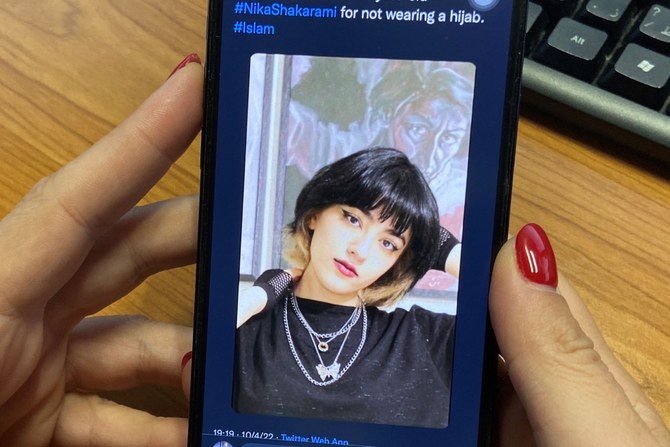
JEDDAH: Iranian authorities ordered the arrest of activists and journalists on Wednesday after a leaked Revolutionary Guard report revealed that secret police had sexually assaulted and killed a teenage girl during Iran’s “hijab protests” in 2022.
Nika Shakarami, 16, died during demonstrations over the death in police custody of Mahsa Amini, who had been detained for wearing her headscarf incorrectly.
Shakarami’s death also sparked widespread outrage. Authorities said she died after falling from a tall building, but her mother said the girl had been beaten.
In a report prepared for the Islamic Revolutionary Guard Corps and leaked to the BBC, investigators said Shakarami had ben arrested by undercover security forces who molested her, then killed her with batons and electronic stun guns when she struggled against the attack.
Iran’s judiciary said on Wednesday that the BBC story was “a fake, incorrect and full-of-mistakes report,” without addressing any of the alleged errors.
“The Tehran Prosecutor’s Office filed a criminal case against these people,” a spokesman said, with charges including “spreading lies” and “propaganda against the system.” The first charge can carry up at a year and a half in prison and dozens of lashes, while the second can bring up to a year’s imprisonment.
It was not clear if prosecutors had charged the three BBC journalists who wrote the report. Those associated with the BBC’s Persian service have been targeted for years by Tehran and barred from working in the country since its disputed 2009 presidential election and Green Movement protests.
Iranian Interior Minister Ahmad Vahidi said the BBC report was an effort to “divert attention” from protests at American universities over the Israel-Hamas war. “The enemy and their media have resorted to false and far-fetched reports to conduct psychological operations,” he said.



